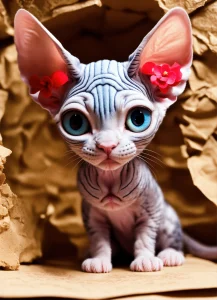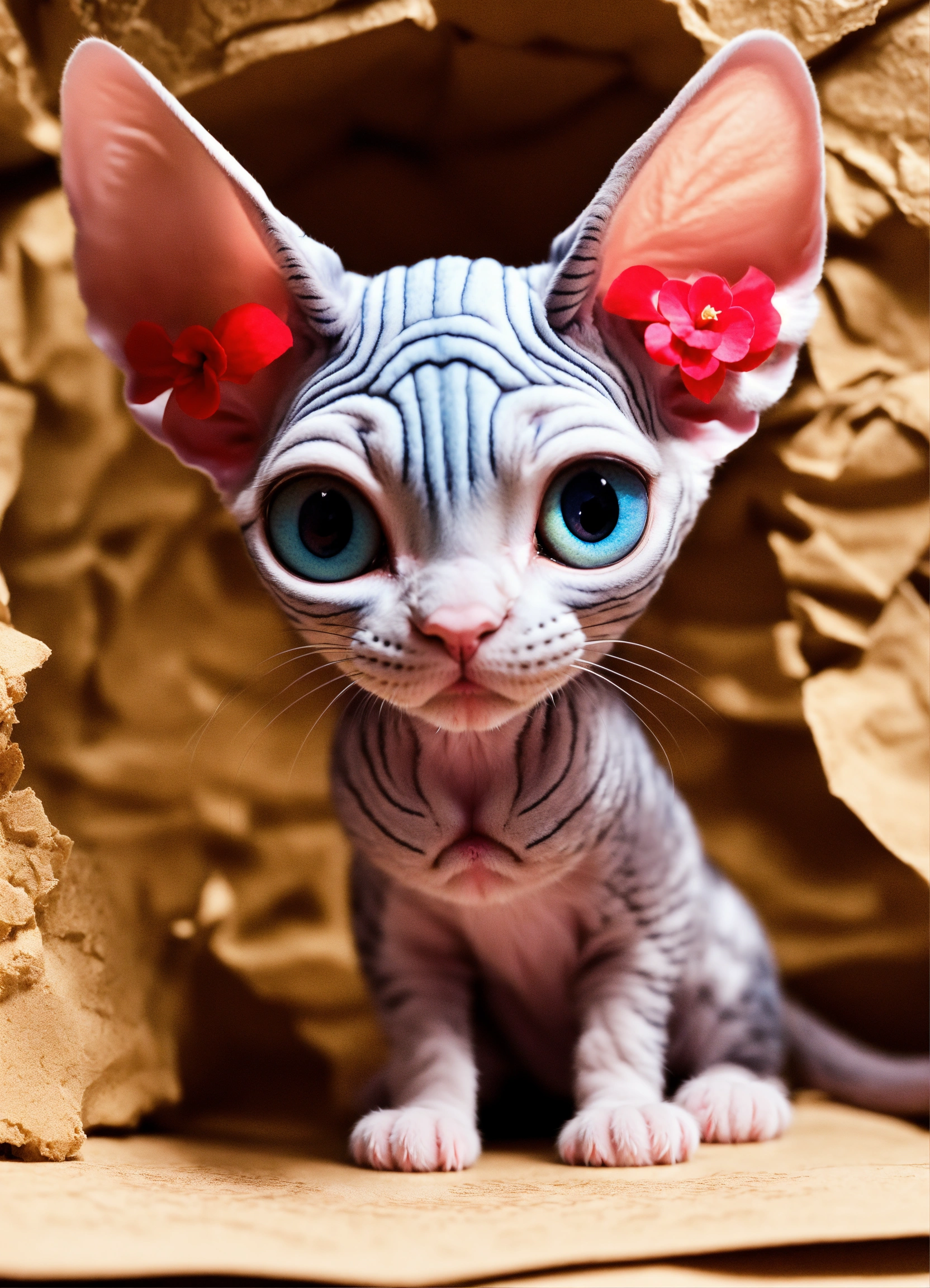The Sphynx cat stands out. You may have seen these hairless felines and wondered, “What are Sphynx cats used for?” Beyond their striking appearance, Sphynx cats have fascinating roles and purposes. This article delves into the various uses and benefits of owning a Sphynx cat, exploring their roles as companions, their impact on various fields, and more.
Introduction to Sphynx Cats
A Brief History of the Sphynx Cat
Sphynx cats, with their distinctive lack of fur, have intrigued cat lovers worldwide. Known for their wrinkled skin and expressive eyes, these cats are more than just a pretty face. They have unique characteristics that make them suitable for various roles and purposes. Understanding what Sphynx cats are used for can help potential owners appreciate their value beyond aesthetics.
Physical Characteristics of Sphynx Cats
Sphynx cats are known for their distinctive appearance. They lack a traditional fur coat, which makes them stand out among other cat breeds. Instead of fur, they have a thin layer of peach-fuzz-like skin, which requires regular care to keep clean. Their large, bat-like ears and wrinkled skin contribute to their striking look. Understanding these characteristics helps in appreciating what Sphynx cats are used for in various contexts.

Companionship and Emotional Support
Why Sphynx Cats Make Great Pets
One of the primary uses of Sphynx cats is as loving companions. Their affectionate nature and playful demeanor make them ideal pets for families and individuals alike. Sphynx cats are known for their sociable and attention-seeking behavior, which means they thrive in interactive environments. They are often described as “dog-like” due to their loyalty and attachment to their human families.
Sphynx Cats in Therapy and Emotional Support
Sphynx cats have also found roles in therapy and emotional support. Their warm, cuddly bodies provide comfort to those in need. The lack of fur can be particularly beneficial for people with allergies, as the reduced shedding means fewer allergens in the home. Many people find that the presence of a Sphynx cat helps alleviate stress and improve mental well-being.
Sphynx Cats in the World of Entertainment
Sphynx Cats in Media and Advertising
Sphynx cats often make appearances in movies, TV shows, and advertisements due to their unique look. Their distinctive appearance and expressive faces make them perfect for roles that require a standout character. Whether it’s as a quirky sidekick or a central figure in a storyline, Sphynx cats bring a touch of the unusual to the screen.
Sphynx Cats as Social Media Stars
In the age of social media, Sphynx cats have also gained fame online. Their unusual appearance and engaging personalities make them popular on platforms like Instagram and TikTok. Many Sphynx cat owners have created viral content featuring their pets, showcasing their playful antics and unique traits.
Health and Research Uses of Sphynx Cats
Sphynx Cats in Veterinary Research
Sphynx cats have played a role in veterinary research, particularly in studying genetic conditions. Due to their unique genetic makeup, they provide valuable insights into skin conditions and other hereditary issues. Researchers use Sphynx cats to better understand certain diseases and develop treatments that benefit both felines and humans.
Sphynx Cats and Allergy Research
Interestingly, Sphynx cats are also involved in allergy research. Their hairlessness reduces the amount of dander they produce, making them a subject of study for understanding and managing pet allergies. This research helps develop solutions for people who suffer from pet allergies but wish to have a furry companion.
Sphynx Cats in the Pet Breeding Industry
The Role of Sphynx Cats in Breeding Programs
In the world of pet breeding, Sphynx cats are valued for their genetic traits. Breeders carefully manage Sphynx cat lineages to maintain the breed’s health and unique characteristics. This includes monitoring for genetic conditions and ensuring that breeding practices promote the overall well-being of the breed.
Ethical Considerations in Breeding Sphynx Cats
The breeding of Sphynx cats raises ethical questions, particularly regarding their health and well-being. Responsible breeders prioritize the health of the cats and ensure that they are not subjected to unnecessary genetic risks. Ethical breeding practices are crucial in maintaining the breed’s integrity and ensuring that Sphynx cats lead healthy, happy lives.
Caring for a Sphynx Cat
Daily Care and Maintenance
Caring for a Sphynx cat involves specific daily routines. Their lack of fur means they are prone to oily skin, which requires regular cleaning. Bathing a Sphynx cat is a regular part of their care, along with routine ear cleaning and nail trimming. Understanding these care requirements is essential for any potential Sphynx cat owner.
Health and Hygiene Tips
Maintaining the health and hygiene of a Sphynx cat involves more than just regular baths. Owners need to pay attention to their cat’s diet, check for skin conditions, and schedule regular vet check-ups. Sphynx cats are generally healthy but require diligent care to ensure they remain in good condition.
Training and Socialization of Sphynx Cats
Training Sphynx Cats: What to Expect
Training a Sphynx cat can be a rewarding experience. These cats are intelligent and responsive, making them relatively easy to train. Basic commands and litter box training are usually straightforward, but Sphynx cats also benefit from interactive play and mental stimulation.
Socializing Sphynx Cats with Other Pets
Socialization is crucial for Sphynx cats, especially if they are introduced to other pets. Their friendly and outgoing nature generally allows them to get along well with other animals. Gradual introductions and positive reinforcement can help ensure that Sphynx cats adapt well to new environments and companions.
Conclusion
In summary, Sphynx cats are more than just a fascinating breed due to their lack of fur. They serve various roles, from loving companions to participants in research and entertainment. Their unique characteristics and charming personalities make them valuable in many contexts. Understanding what Sphynx cats are used for helps potential owners appreciate their multifaceted nature and the diverse roles they play in our lives.
FAQs
1. What are Sphynx cats best known for?
Sphynx cats are best known for their hairlessness and distinctive wrinkled skin. They are also recognized for their affectionate and playful nature.
2. Are Sphynx cats hypoallergenic?
While no cat breed is completely hypoallergenic, Sphynx cats are considered a better option for people with allergies because they produce less dander compared to furred cats.
3. How often do Sphynx cats need to be bathed?
Sphynx cats should be bathed regularly, typically every 1-2 weeks, to manage the oils on their skin and keep them clean.
4. What kind of diet is best for Sphynx cats?
Sphynx cats benefit from a balanced diet rich in high-quality protein. Their diet should be tailored to their specific needs, with regular vet consultations to ensure their nutritional requirements are met.
5. How can I help my Sphynx cat adjust to new pets?
To help a Sphynx cat adjust to new pets, introduce them gradually and monitor their interactions. Use positive reinforcement to encourage friendly behavior and ensure both your Sphynx cat and the new pets feel comfortable in their environment.

